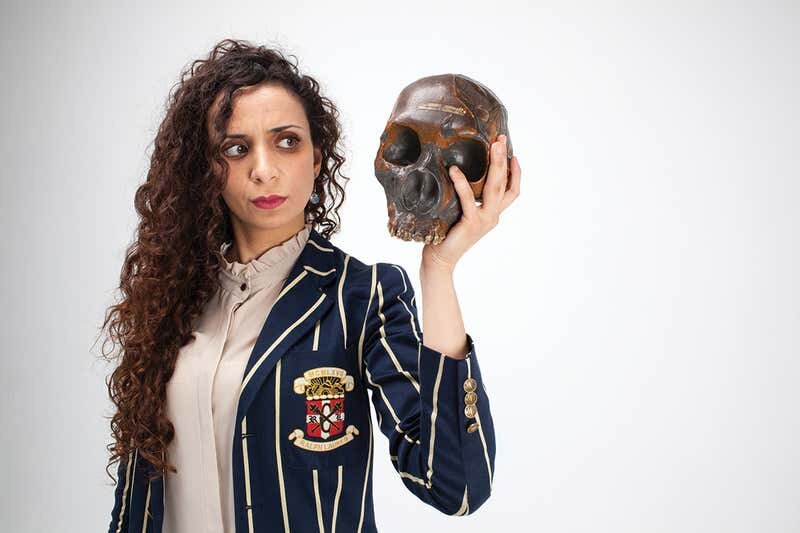FIELD EXPERTS
-

Ella Al-Shamahi
Ella Al-Shamahi is a paleoanthropologist, evolutionary biologist, TV presenter, and stand-up comic. Specializing in Neanderthals, caves, and expeditions in hostile, disputed, and unstable territories, she believes in using expeditions to shed light on some of the most misunderstood and disadvantaged people and places on earth.
-

Justine Ammendolia
Justine is a marine biologist, plastic pollution researcher and science communicator based in Toronto. COVID-19 canceled her fieldwork so she started a backyard science project to document the unexpected environmental impact of single-use medical plastics.
-

Martin Edström
Award-winning National Geographic Explorer, Martin uses interactive and immersive techniques to tell the important stories of our time in moving and inspiring ways. Through numerous expeditions and exploration projects, Martin has brought audiences inside the wild and forgotten corners of the world—from the heights of Mt. Everest to the depths of the largest cave in the world in Vietnam.
-

Juliana Machado Ferreira
Juliana Machado Ferreira is a conservation biologist working to combat wildlife trafficking in her home country of Brazil. She is the Executive Director of FREELAND Brazil and serves as a steering group member for The Global Initiative to End Wildlife Crime.
-

Clare Fieseler
I’m both a journalist and scientist. My bylines have appeared in outlets like Vox, Slate, National Geographic, and The Washington Post. I also maintain a research appointment at the Smithsonian’s National Museum of Natural History where I work with Dr. Nick Pyenson on a National Geographic Society-funded research project.
-

Keolu Fox, PhD
Kānaka Maoli (Native Hawaiian) is an assistant professor at UCSD. Dr. Fox’s multi-disciplinary research interests include genome sequencing, genome engineering, computational biology, evolutionary genetics, paleogenetics, and Indigenizing biomedical research.
-

Annie Griffiths
Annie Griffiths was one of the first female photographers at National Geographic. She is the founder of Ripple Effects Images and has photographed in nearly 150 countries over the course of her career.
-

Anicca Harriot
Anicca is a Biochemistry & Molecular Biology PhD Candidate at the University of Maryland, School of Medicine. Her research focuses on the mechanisms responsible for skeletal muscle atrophy and injury. Anicca plans to use her degree to explore the effects of long duration space missions on the human body and hopes to someday venture out into the final frontier for herself.
-

Peg Keiner
Peg creates space for communities to solve the problems that matter to them by helping them use technology to express themselves, collect data, and drive positive action. She is the director of innovation at GEMS World Academy Chicago, a National Geographic Fellow, Apple Distinguished Educator, Google Earth Education Expert, Global Goal Ambassador for the United Nations Association Chicago Chapter and podcast host.
-

Elise Laugier
Elise Laugier is an archeologist and remote sensing specialist. She blends drones, satellite imaging, and other technology with more traditional geospatial, geochemical, and micro-botanical approaches to discover and preserve history.
-

Danielle N. Lee
Danielle is a TED Fellow, National Geographic Emerging Explorer and Assistant Professor at Southern Illinois University Edwardsville who studies studies animal behavior and behavioral ecology focusing on African giant pouched rats in Tanzania. She also knows the urban wildlife in your backyard, what they do, why, how, and when. As an Outreach Scientist she shows you that science is for everyone and doesn’t mean you have to travel far from home.
-

Moreangels Mbizah
Moreangels Mbizah is a conservation biologist with a PhD in zoology. She’s the founder and executive director of Wildlife Conservation Action, which works to reduce human-wildlife conflict while empowering and improving livelihoods for communities living near wildlife areas.
-

Sandhya Krittika Narayanan, PhD
Sandhya is a linguistic anthropologist and assistant professor specializing in the maintenance of multilingualism in indigenous and minority communities around the world, and the relationship between linguistic diversity and social and political change over time.
-

Wasfia Nazreen
Wasfia Nazreen is a widely acclaimed mountaineer and activist who inspired her home country of Bangladesh by climbing the 7 summits, the tallest peak on each continent. She is also the founder of Ösel Bangladesh, a foundation that serves and empowers young girls through education and outdoor expeditions.
-

Gabby Salazar
A nature and conservation photographer whose research focuses on evaluating the impact of conservation marketing and outreach campaigns. Salazar has worked on environmental photography projects across the world, from Indonesia to Peru. Salazar has also served as the youngest president of the North American Nature Photography Association. She continues to teach photography to children and teenagers around the world.
-
Becky Schnekser
Once a reluctant science teacher, Becky now takes her elementary-aged scientists on virtual field trips to the Amazon, spelunking explorations right in the classroom, and all-weather research trips to the school's rainwater collection ponds. In Expedition Science, Schnekser demonstrates how you can immerse young learners in authentic, exciting science and empower them to engage, discover, and lead.
-

Prasenjeet Yadav
Molecular ecologist turned photographer and a National Geographic Explorer, Prasenjeet’s work sheds light on sensitive issues and unique ecosystems throughout the Indian Subcontinent. He uses both science and storytelling to capture the beauty and wonder of important environmental issues to make them accessible and engaging.
-

Erika Woolsey, PhD
A marine biologist, National Geographic Explorer, XR creator, Visiting Scholar at the Stanford University Virtual Human Interaction Lab, and leader of 501c3 non-profit The Hydrous, Dr. Erika Woolsey is dedicated to inquiry-based learning and public engagement of science.
